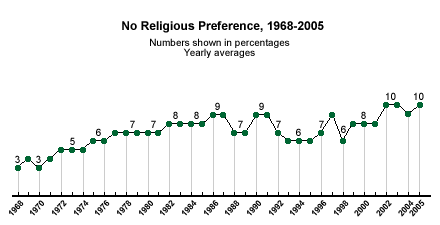The Los Angeles Times recently ran a story on the upsurge in "religious doubt" in the United States, touting research that shows the percentage of Americans who claim no religious preference more than doubled between 1990 and 2001. According to the 2001 American Religious Identification Survey (ARIS), more than 29 million adults do not identify with any religion, up from 14 million in 1990. Eight percent identified "none" as their religious preference in 1990, compared with 14% in 2001.
How do these results compare with Gallup's polling data? Gallup has asked Americans about their religious preference for more than 55 years, but for the purposes of this analysis, we will begin our trend in 1968. In that year, an average of 3% of Americans claimed no religious preference. The average percentage has increased gradually since then, and the average so far in 2005 stands at 10%*.
Gallup's percentages are slightly different from those gathered in the 1990 National Survey of Religious Identification and 2001 ARIS studies. In 1990, an average of 9% did not identify with a religion in Gallup surveys, and in 2001, an average of 8% did so. But there have been some minor fluctuations in the yearly estimate between 1990 and 2005.

One explanation ARIS researchers gave for the significant rise in their "none" percentage is that changes in the question wording may account for some of the difference. Their press release states, "The 1990 figure may be downwardly biased due to a slight change in the wording of the key survey question in 2001. In seeking a more accurate measure of identification, the clause 'if any' was added this year to the question, 'What religion do you identify with?' The prior wording may have subtly prompted respondents to name some religion." Gallup made a similar change to its wording in 2000, and beginning this year has made "no religion" a more explicit part of the question.
Who Are the "Nones?"
It seems evident that more Americans are claiming no religious affiliation now than was the case a generation ago. In order to get a better idea of who the "nones" are, we aggregated the results of all Gallup surveys conducted so far this year.
- Men are marginally more likely than women to claim no religious preference (13% of men vs. 8% of women). That's not surprising given than women tend to score higher on most of Gallup religiosity measures.
- As might be expected, there are more "nones" in the lower age categories: 17% of 18- to 29-year-olds claim no religious preference, compared with 10% of those between the ages of 30 and 64 and just 4% of those 65 and older.
- There's a slight skew toward higher levels of education among the "nones": about 12% of college graduates and those with postgraduate education claim no religious preference, compared with 9% of those with a high school degree or less.
- A liberal political ideology is typically associated with a more secular outlook than is conservatism. Accordingly, 19% of self-identified liberals claim no religious affiliation, compared with 10% of moderates and 5% of conservatives.
- In terms of political parties, those who claim no political affiliation are also least likely to claim religious affiliation: 15% of political independents claim no religious preference, as do 11% of Democrats and 5% of Republicans.
*Results are based on interviews with 24,926 randomly selected national adults in Gallup Polls conducted January to November 2005.
